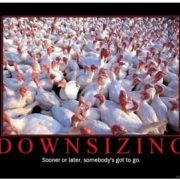The Death of the Mutual Fund
ETF?s are much more attractive than mutual fund competitors, with their notoriously bloated expenses and spendthrift marketing costs. You can?t miss those glitzy, overproduced, big budget ads on TV for a multitude of mutual fund families. You know, the ones with the senior couple holding hands walking down the beach into the sunset, the raging bulls, etc.? You are the sucker who is paying for these. Sometimes I confuse them for Viagra commercials.
I once did a comprehensive audit on a mutual fund, and a blacker hole you never saw. There were so many conflicts of interest it would have done Bernie Madoff proud. Any trainee assistant trader can tell you that more than 90% of all mutual fund managers reliably underperform the indexes, some grotesquely so.? Published performance is bogus, they show a huge survivor bias, not including the hundreds of mutual funds that close each year. And there?s always that surprise tax bill at the end of the year.
If there was every an industry crying out for a fundamental restructuring, consolidation, price competition, and ultimately a whopping great downsizing, it is the US mutual fund industry. ETF?s may be the accelerant that ignited this epochal sea change, with the number of mutual funds recently having shrunk from 10,000 to 8,000. It?s still early days, with ETF?s only accounting for 5-6% of trading volume, even though they have been around for a decade.
The Mutual Fund?s Days Are Numbered



